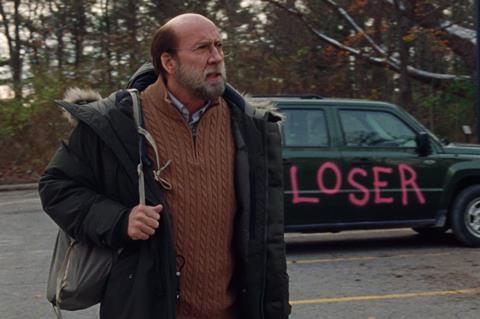Nicolas Cage starts to appear in other people’s dreams in this sharp, provocative horror/comedy produced by Ari Aster

Dir/scr: Kristoffer Borgli. US. 2023. 100mins
Though it’s early in writer/director Kristoffer Borgli’s career, he has already developed a love for neurotic, narcissistic protagonists. The pitch-black, satirical horror comedy Dream Scenario further develops that interest, as evidenced in his debut Sick Of Myself. This time it’s timid dork Paul Matthews (Nicolas Cage) who pines for recognition, and finds notoriety when he begins appearing in random people’s dreams. The unexplicable phenomenon offers him unimaginable fame and, later, unspeakable horror. Competing in Toronto’s Platform selection, this is an ambitious, often provocative interrogation of masculinity, cancel culture, social media, and the power of celebrity through a humorous lens.
Borgli’s film is tailored for an A24 fanbase, who will devour this mordant contemporary comedy with midnight sensibilities.
The film marks Cage’s second recent foray examining fame. In The Unbearable Weight Of Massive Talent, Cage parodied his most famous roles for an adoring fan; in Dream Scenario, playing a professor of evolutionary biology, the actor approaches the topic through his familiar love of oddball characters. Cage initially plays Paul as painfully sincere, the kind of earnestness the actor displayed in Adaptation, before imperceptibly shifting him into crushing sanctimoniousness. Paul claims he loves anonymity, but the closer he steps to notoriety, the less he can contain his glee. A collision of A Nightmare on Elm Street and Beau Is Afraid — Ari Aster co-produced Dream Scenario — Borgli’s film is tailored for an A24 fanbase, viewers who enjoy independent films featuring veteran star power, who will devour this mordant contemporary comedy with midnight sensibilities.
Dream Scenario plays clearest when parsing the impotence Paul feels. It opens with Paul raking leaves by the pool as his daughter sits at a patio table. A key falls from the sky, then a shoe, then a body — before she is lifted away into the sky. Paul stands idly by, paralyzed. It’s a recurring dream she has been having for days with the same outcome, the inaction of her dad. He soon starts to appear in the dreams of his students, friends, and even strangers. In one instance a monster hunts a student in the woods, in another an earthquake takes place on campus. No matter the situation, Paul passively, creepily, strolls into the frame, with Cage displaying a quiet physical humor.
Paul can’t protect his family — his twin daughters or his supportive wife (Julianne Nicholson) — or anyone else for that matter. The dreams become an outgrowth of Paul’s frustrated sense of place, his feeling of invisibility. Most people either ignore him or find him weird, with his nasally laugh, and obvious desperation. But they all come to love him when he attains a modicum of celebrity status from appearing in dreams. Even a startup headed by Michael Cera reaches out with a commercial deal.
The film becomes hazy when it turns nightmarish. Paul’s benign projection begins attacking dreams; his real-life popularity quickly dwindles. Borgli’s editing transforms from calm strikes to rapid horror movie cuts; the once bright score becomes a dark two-tone melody; Benjamin Loeb’s cinematography fascinatingly doesn’t shift, rather the context does. The low angles that earlier were used to show Paul’s awkward frame arereinterpreted as menacing later. Borgli’s script connects that subtle shift in perception to cancel culture: It’s not Paul who’s at fault, but people’s intolerance to being triggered that’s to blame. He loses his teaching job (a comment on the safe space culture of contemporary campus life); his wife leaves him; his children fear him.
Dream Scenario is on far firmer ground when parsing Paul’s anxieties or as it slices through meme culture (how the virality of celebrities ultimately turns corporate). With cancel culture, Borgli merely pokes and prods the phenomenon rather than pinning it down. Borgli skewers both the self-serving damage control employed by the cancelled and the uncontrollable vitriol of the canceller. Cage is game to push the border, adding intentionality to scenes that in a lesser actor’s hands would only play as hollow provocations and broad metaphors for connecting the ephemeral nature of scandal to the short memorability of a dream. Because for daring and inspired cinema to happen, it starts with a dream actor like Cage, an artist at the top of his game, to make it a believable reality.
Production companies: A24, Squarepeg
International sales: A24
Producers: Ari Aster, Lars Knudsen, Tyler Campellone, Jacob Jaffke, Nicolas Cage
Screenplay: Kristoffer Borgli
Cinematography: Benjamin Loeb
Production design: Zosia Mackenzie
Editing: Kristoffer Borgli
Music: Owen Pallett
Main cast: Nicolas Cage, Julianne Nicholson, Michael Cera, Tim Meadows, Dylan Gelula, Dylan Baker






![The Brightest SunScreen[Courtesy HKIFF]](https://d1nslcd7m2225b.cloudfront.net/Pictures/274x183/3/5/0/1448350_thebrightestsunscreencourtesyhkiff_312678.jpg)












![The Brightest SunScreen[Courtesy HKIFF]](https://d1nslcd7m2225b.cloudfront.net/Pictures/100x67/3/5/0/1448350_thebrightestsunscreencourtesyhkiff_312678.jpg)




